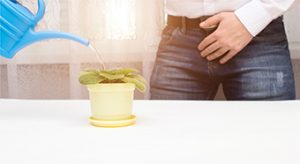What is Urinary Incontinence?
 Urinary incontinence is the inability to take control of the holding in urine in the bladder. This is usually cause by weak or too active muscles that keeps the urine from leaking out of the urethra. Weak urethra muscles can’t handle the pressure build up in the bladder at which a simple sneeze or cough will result in incontinence. And too much active muscles will have the same result. Abnormal nerves send signals to the bladder at the wrong time, causing its muscles to squeeze without warning leading to a strong urge to go to the bathroom even when there is still little urine in the bladder. Studies shows Women are more likely to have urinary incontinence than men. Up to 35% of the total population over the age of 60, averaging over one in three women are estimated to have bladder control problems.
Urinary incontinence is the inability to take control of the holding in urine in the bladder. This is usually cause by weak or too active muscles that keeps the urine from leaking out of the urethra. Weak urethra muscles can’t handle the pressure build up in the bladder at which a simple sneeze or cough will result in incontinence. And too much active muscles will have the same result. Abnormal nerves send signals to the bladder at the wrong time, causing its muscles to squeeze without warning leading to a strong urge to go to the bathroom even when there is still little urine in the bladder. Studies shows Women are more likely to have urinary incontinence than men. Up to 35% of the total population over the age of 60, averaging over one in three women are estimated to have bladder control problems.
What are the Types of Urinary Incontinence?
- Stress Incontinence – leaking discrete amount of urine during a physical action like coughing, sneezing, lifting even laughing.
- Urge Incontinence – leaking great amount of urine unexpectedly, even if you just started to feel like urinating.
- Overactive Bladder – This is usually cause by inappropriate bladder spasm due to damaged nerves making the bladder go into contractions thus making it squeeze out the urine.
Specific Overactive Bladder Symptoms:- Frequent urination, going in and out of the comfort room more than 8 times a day is very troublesome.
- That strong feeling of urinating immediately and that you no longer can control.
- Wetting of the undergarments by leaking urine from the urethra
- Waking up in the middle of the night just to urinate.
- Functional Incontinence – is due to the incapability of the person to reach the toilet in time for urination. A perfect example for this are the people who in a wheel chair, or those who have arthritis that can’t speed up their pace.
- Overflow Incontinence – occurs when the bladder is not properly emptied, so urine accumulates and starts to do spill over.
What are the Causes of Urinary Incontinence?
There are many factors that can cause urinary incontinence, to name one is the anatomy of the human, it may be a birth defect or an accident that change the way a normal bladder would function. Certain medications such as diuretics, antidepressants, tranquilizers, some cough and cold remedies, and antihistamines for allergies can cause this abnormality. As we grow older, urinary incontinence becomes more common for old age, a sign of deterioration of the body. Obstruction to the urinary tract, blockage of the normal flow of the urine usually causes overflow incontinence.
Because of pregnancy females are more prone to have urinary incontinence than men. Pregnant women may experience stress incontinence because of hormonal changes and the increased weight of an enlarging uterus. Women giving birth vaginally, rather than with a caesarean, may be associated with stress incontinence.
Urinary Incontinence Treatment
To treat Urinary Incontinence symptomatically, patients can usually use absorbent products, diapers, or catheters. It doesn’t really cure Incontinence but it temporarily stops leaking urine from the bladder. Some are cured by psychological means, others use kegel exercise to strengthen their urinary tract muscles. Severe cases of urinary incontinence are treated by specialized urologist. Depending on the diagnosis, some may lead to simple medication others have surgery.
